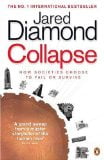 Collapse: How Societies Choose to Fail or Survive
Collapse: How Societies Choose to Fail or Survive
by Jared Diamond
Penguin, £9.99, ISBN 0-140-27951-2
“The monumental ruins left behind by [collapsed] societies hold a romantic fascination for all of us. We marvel at them when as children we first learn of them through pictures… We feel drawn to their often spectacular and haunting beauty, and also to the mysteries that they pose.”
We have all met people who are, one might say, over-fascinated by what we can’t know about Stonehenge, Easter Island, Chichen Itza or Brighton.
Beyond counting, even now, are the legions of followers of von Daniken or Tony Hancock’s rather less amusing cousin, Graham.
Here is one way of fighting back. Cajole, bully or trick them into reading this superb book by a writer equally at home in history and evolutionary biology. Let these bores and fantasists, perhaps for the first time, gain a shattering insight (or dim inkling) as to what intelligent reasoning about the past actually looks like.
Easter Islanders managed the twin feats of erecting 12-ton stone statues with ropes, “canoe ladders” and ramps, and then obliterating all species of trees on the island. This deforestation led to starvation and cannibalism. Extraterrestrial masons do not seem to have played a huge part in all this.
Diamond discusses the Mayans and the Vikings, Montana and Rwanda, among other communities and ecologies. In the horrendous case of Rwanda, he notes that, “any ‘explanation’ of why a genocide happened can be misconstrued as ‘excusing’ it”, and insists that, “it is important that we understand the origins of the Rwandan genocide – not so that we can exonerate the killers, but so that we can use that knowledge to decrease the risk of such things happening again.” One of the contributing factors was the Malthusian condition of population pressure exhausting resources, but Diamond is careful to avoid ecological determinism, applying his nuanced comparative method throughout.
The last hundred pages of the book are devoted to practical lessons, asking why some societies make disastrous decisions, outlining our most serious problems, and offering reasons for hope.
Paul Taylor



